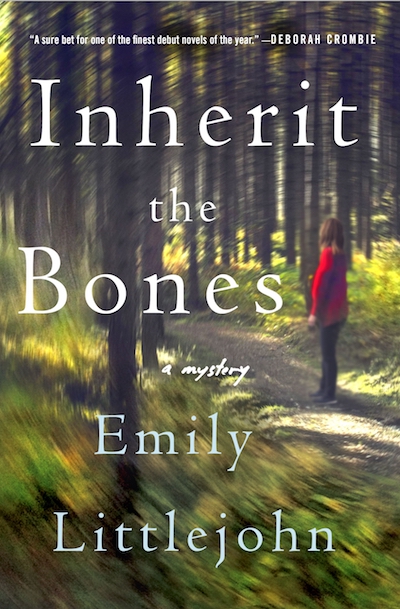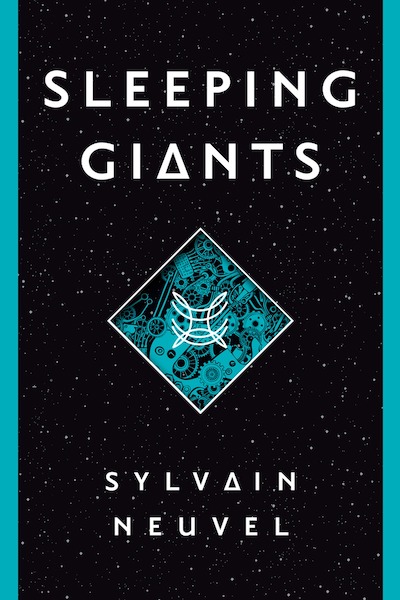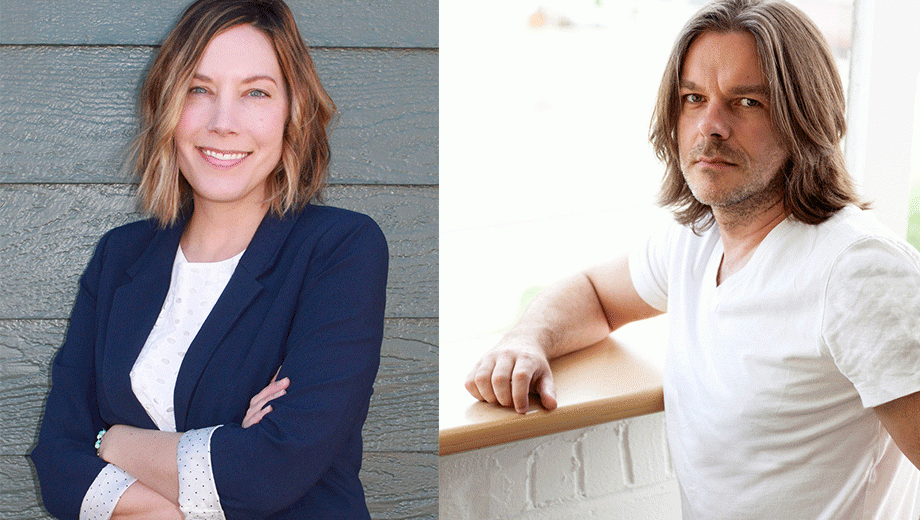A librarian for 10 years in her day job, Emily Littlejohn, AM’02, now also writes her own books. Her debut novel, Inherit the Bones: A Mystery (St. Martin’s Press, 2016), follows a small-town Colorado police detective—who happens to be six months pregnant—as she investigates a chilling murder. Declared a “series to watch” by Booklist, Inherit the Bones earned a starred review and was Library Journal’s debut of the month last October. Book two of Littlejohn’s Cedar Valley Series comes out this fall.
Sylvain Neuvel, PhD’03, spent eight years studying linguistics. Now he works as a director of translation services, a software engineer, and a science fiction author. His first novel, Sleeping Giants (Del Rey, 2016)—which landed a movie deal with Sony Pictures Entertainment before it even hit bookstores last spring, and was nominated for a 2016 Goodreads Choice Award in Science Fiction—unravels the mystery of a giant alien robot scattered in pieces across the world. The story continues in Waking Gods, which came out in April.
What sparked your career as an author?
EL: After Chicago I got a second master’s in library sciences and spent the last 10 years as a librarian and then a library director. I’m the library services manager at the Westminster Public Library in Westminster, Colorado. Having read so many things, I’d been exposed to some books that I didn’t think were all that great. So my frame of mind was, “Well, if they can do this, why can’t I?” That’s what made me start taking my writing seriously, about four years ago. My first book was written as a hobby over nights and weekends here and there.
SN: I remember writing comic books as a kid and selling them for 50 cents a pop to the neighbors so I could buy candy. I was five or six years old. They had spaceships because they were easy to draw, and the earth was saved from invasion from evil-looking little aliens. When I got a bit older, I wrote articles for the local newspapers. I also wrote the script for a TV show that was optioned but never produced.
I started writing my first novel mostly for the fun of it. My kid was about two-and-a-half or three at that time. I asked him if he wanted me to build him a toy robot—I work on a computer all day at Onscope in Montreal, so once in a while I like to build a physical object—and he started asking a bunch of questions about the robot, like, “Where is it from? What does it do?” I had no answers, so I started thinking about it. Eventually I began writing what would turn out to be Sleeping Giants.
Does your humanities background influence your work?
 EL: I’ve always been a huge fan of horror, suspense, and scary stories, especially Henry James and other classical and Gothic horror. I wrote my MA thesis on Bram Stoker’s Dracula. At the time I was planning to become an English teacher or professor, and MAPH [Master of Arts Program in the Humanities] helped round out my background in terms of more recent literature.
EL: I’ve always been a huge fan of horror, suspense, and scary stories, especially Henry James and other classical and Gothic horror. I wrote my MA thesis on Bram Stoker’s Dracula. At the time I was planning to become an English teacher or professor, and MAPH [Master of Arts Program in the Humanities] helped round out my background in terms of more recent literature.
At the very base level, the more you read, the better writer you are. It’s kind of like piano. The more you practice, the more different composers you’re exposed to, the wider repertoire you end up having when you try to do it yourself.
SN: The biggest thing I got out of my PhD is that I spent a few years hanging out with really, really smart people every day. It gets your brain going, and it gets you interested in a bunch of stuff you would’ve never thought about otherwise. So I started reading about different fields, getting books in physics and biology just for the heck of it, and much of that applied to Sleeping Giants. There’s way more research in that book than in my PhD, and it’s in a gazillion fields that I know nothing about. I’ve had a lot of fun writing so far just because of that—doing the research and learning about new things. That’s something I owe to my time in Chicago.
In terms of how I apply linguistics, that’s sort of like asking a car mechanic if he drives differently because he knows mechanics. There's humor in the books, and I can explain in linguistic terms where the humor comes from, but I might’ve made the same joke anyway. Sleeping Giants is mostly a series of interviews. That might be one way my linguistics background influenced me without me knowing it, because the whole book is spoken language written down.
How did you get your first book published?
EL: The first thing I did was to get an agent. I just did a lot of research on things like how to write a query letter, how to figure out which agents represent which genre. I sent out about 50 query letters. Pam Ahearn really liked the story. She had a few suggestions for some revisions, so we went back and forth until we were happy with it, and she agreed to represent me. That was really the first step to getting published: getting an agent. Pam reached out to editors and publishing houses that she knew, and we ended up with St. Martin’s Press. The second book in the series comes out next fall.

SN: I sent query letters to maybe 55 agents trying to get a publisher. About 20 of them turned me down. The rest didn’t answer. So I figured, “What the hell—I'll just self-publish the thing and see what happens.” I’d been told it wasn’t a great move, that it could hurt your writing career. But I didn't have a writing career to hurt. I was 40 and had a good job. So I started a little publishing company to promote the book.
One of the steps was to get a quote from a literary magazine to put on the cover to make it look somewhat serious, so I sent the book to Kirkus Reviews. They have a reputation for being mean, but I figured I could at least squeeze in a few words. Eventually I got the review and it was insanely good. Before I knew it I’d sold the movie rights to Sony and landed a three-book publishing deal with Del Rey.


Add new comment